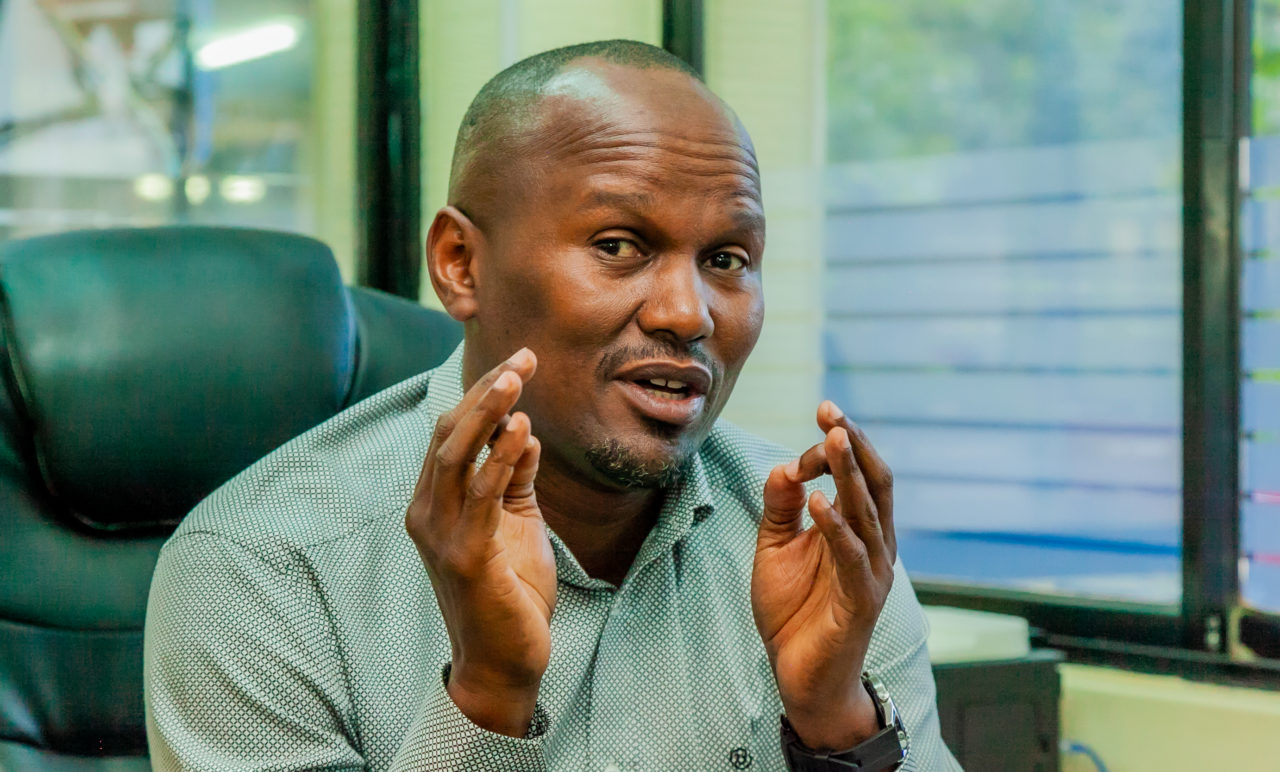advertisement
From Nyumba Yangu To COVID-19; David Igweta Speaks

That COVID-19 has disrupted “business as usual” is no longer in doubt. Organisations have had to sustain their business continuity plans, embraced remote working and e-meetings to circumvent the effects of the pandemic. Board members could not refrain from including digital transformation as part of their top agenda amid business continuity efforts – be it in public or private – averred David Igweta, CIO & Ag. COO, HF Group as organisations steadily came to terms with the magnitude and risks resulting from COVID-19. According to Igweta, the fast-changing global environment is now dictating the pace of digital adoption. Granted, post-COVID -19 some roles will likely become extinct as new career opportunities emerge especially in the digital space. As the social distancing directive given by governments to flatten the curve gains momentum, this has led to digital transformation on steroids as brands adapt. In the banking industry, for instance, we are seeing digital banking channels becoming the main channel of transactions as opposed to preferred brick and mortar. Igweta affirms that HF Group has embraced government directives and has already taken measures to safeguard the wellbeing of employees during this period. Besides enhanced hygiene standards and screening by use of temperature guns on the arrival of clients into the building, the Group has embraced a remote working from home model. The Group has also sustained the momentum of its digital transformation initiatives while looking to enhance customer experiences. Customers who have been urged to go digital.
Here is the one-on-one condensed interview.
Considering the disruption and widespread impact resulting from COVID-19, what, from the CIO’s standpoint, has HF Group done in response with your workforce, operations and finance as well as a supply chain to handle the crisis?
advertisement
We have quickly adapted to the current pandemic by implementing a number of initiatives. We have activated our BCM plans, which have seen us create the capability of almost the entire ICT unit supporting the business from their homes while offering seamless service. We have also quickly adapted our systems to meet regulator directives to meet our customers’ needs. Making technology available for business continuity for various business teams is another key measure. This means different business teams can quickly realign their strategic objectives and use technology to meet the overall organisational goals. We’ve also done process reengineering to fit the current situation. Our customers can now bank from the comfort of their homes without having to show up physically.
How are you coping with the government’s measure of social distancing?
In line with best practice, we made sure our core banking systems and channels adhered to our Business Continuity Plans. We interrogated, tested and updated our BCP annually. We have now instituted our plan which includes the segmentation of our staff into two different teams that work in separate locations. This enables continuity in the event one team is affected by the virus and put in quarantine. We activated telecommuting for the different teams and access key systems remotely. Our IT security team has also increased the level of monitoring of connections and communication. Interestingly, we have noted that productivity has improved. Reason? With remote working, no one wastes time in traffic. Individuals work passionately, going as far as putting in extra hours from the comfort of their homes.
advertisement
What does such a situation say about your Group’s digital transformation and by extension, to its partners when it comes to solutions?
One of the pillars of the government’s Big 4 agenda is affordable housing. As a key private sector player in mortgage financing, HF has been at the forefront of easing access to affordable housing to aspiring homeowners. We have done this through digitisation and optimisation of processes. For instance, the Group’s savings plan dubbed Nyumba Yangu creates a platform for aspiring first-time homeowners. They save while enjoying tax benefits, a package available via the HF Whizz platform, making it easy for customers to deposit and track the progress of their savings directly from their mobile phones.
In your view, to what extent have FSIs benefitted from regulations to improve financial inclusion and serve a broader digital economy?
advertisement
The financial services industries (FSIs) have become more innovative. This has led to the introduction of a myriad of customer-centric digital products across different sectors. These digital products have significantly improved revenue for the FSIs. In this regard, the adoption of technologies such as the cloud has seen us manage operational costs with significant strides. Currently, aside from the core banking system, we are running all other systems on Microsoft Azure.

What were some of the key innovations expected to accelerate the growth of FSIs in 2020 but were partially slowed down by COVID-19?
In my opinion, IoT is one of the key technologies propagated thanks to the pandemic. With the adoption of 5G locally and globally, businesses have an opportunity to build services and products that meet customer expectations through IoT. For instance, last year we saw this adoption by Burger King in Mexico where they took orders and made deliveries to customers in heavy traffic through the use of IoT. The other major shift will be in the way we handle customer data following the need to work remotely or in unconventional locations. Solutions for data loss prevention, data management and classification and mobile device management will suddenly come to the fore in every institution and especially FSIs. ICT executives not thinking along this line will have a difficult time remaining relevant.
What major leaps has HF Group made since accelerating its digital transformation pace?
Following the launch of HF Whizz in April 2018, we have been able to increase our customer base and strengthen the bank’s narrative as a mortgaged house. We have invested in key tech tools that have allowed us to scale up cases on the platform with tools that have allowed us to build micro-services that we reuse to continue meeting our customers ever-changing needs. In the current season of the pandemic, the technology investments done thus far are proving to be vital and opportune. Our customers can access money transfer services and other transaction options in the comfort of their homes in line with social distancing measures. One of the key strategies we are employing is to ensure that the experience on the Whizz platform is seamless. This has become a serious differentiator especially now that most banks are going digital. We are using tools like Firebase to monitor customer behaviour on the platform, fix arising issues through platform enhancement and patches. We continue to design and implement new propositions together with our business teams to ensure maximum value is delivered to our customers during this season and beyond.
From your perspective, to what extent has the COVID-19 crisis granted the FSI sector an opportunity to double-up digital solutions or has the sector slow down to watch how things will pan out then resolve later?
The COVID-19 crisis has reinforced the need to enhance or build digital solutions. To survive in the current crisis, it has become necessary for FSI sector players to ensure the digital solutions offered to their customers are always available and work as expected. We expect this trend to extend beyond the crisis. Our customers have morphed over the years and are big on preference and convenience rather than visiting our brick and mortar branches to be able to conduct simple banking transactions. In addition, we are likely to experience a significant reduction in the usage of physical cash. Mobile money will be the preferred mode of exchange. FSI sector players must adapt to this paradigm shift and develop appropriate digital solutions.
Do you think the current crisis will lead to a significant reduction of HF Group branches, now that it is clear staff can work from home?
The current crisis will not have an impact on the branch network as these are not densely distributed. Our focus is not on closing the branches but rather elevating these to sales and service centres whilst leveraging the HF Whizz digital channels for customer transactions.
In your view, what is the biggest challenge converting from a legacy bank to an efficient customer-centric ‘digital bank?’
My thoughts on this resonate with Buckminster Fuller, an American futurist who once said, “You never change things by fighting the existing reality. To change something, build a new model that makes the existing model obsolete.” Today, one of the biggest challenges FSIs undergo hinges on understanding how to leverage new technologies to scale customer experience. Once an organisation surmounts this, the sky is the limit!
What, in your opinion, is better? To collaborate with Fintech or for an organisation to build digital solutions from within?
In my opinion, it is important for an organisation to own its backend platform that powers the different channels accessed by the customers. This allows for agility. That way an organisation can manage costs of rolling out new products, fixing application bugs and enhance existing products. With this background, partnership with Fintech solution providers to solve customer needs becomes easier and faster to go to market. Organisations should therefore focus on ensuring that the middleware has open APIs that power such partnerships. At HF we have made it deliberate to own and develop what differentiates us from the rest of the market.
Since there will definitely be major winners and some losers resulting from this unprecedented disruption, what in your view is the way forward?
There is a new normal. Sounds cliché but it’s real! This is a moment to learn, change and prepare. It is important for us to adapt to the new reality brought about by the pandemic. Many of the changes forced upon the world are likely to be our new future. It is an exciting time to experiment with emerging technologies, create great products and services for our customers, and in turn positively change our bottom-line!